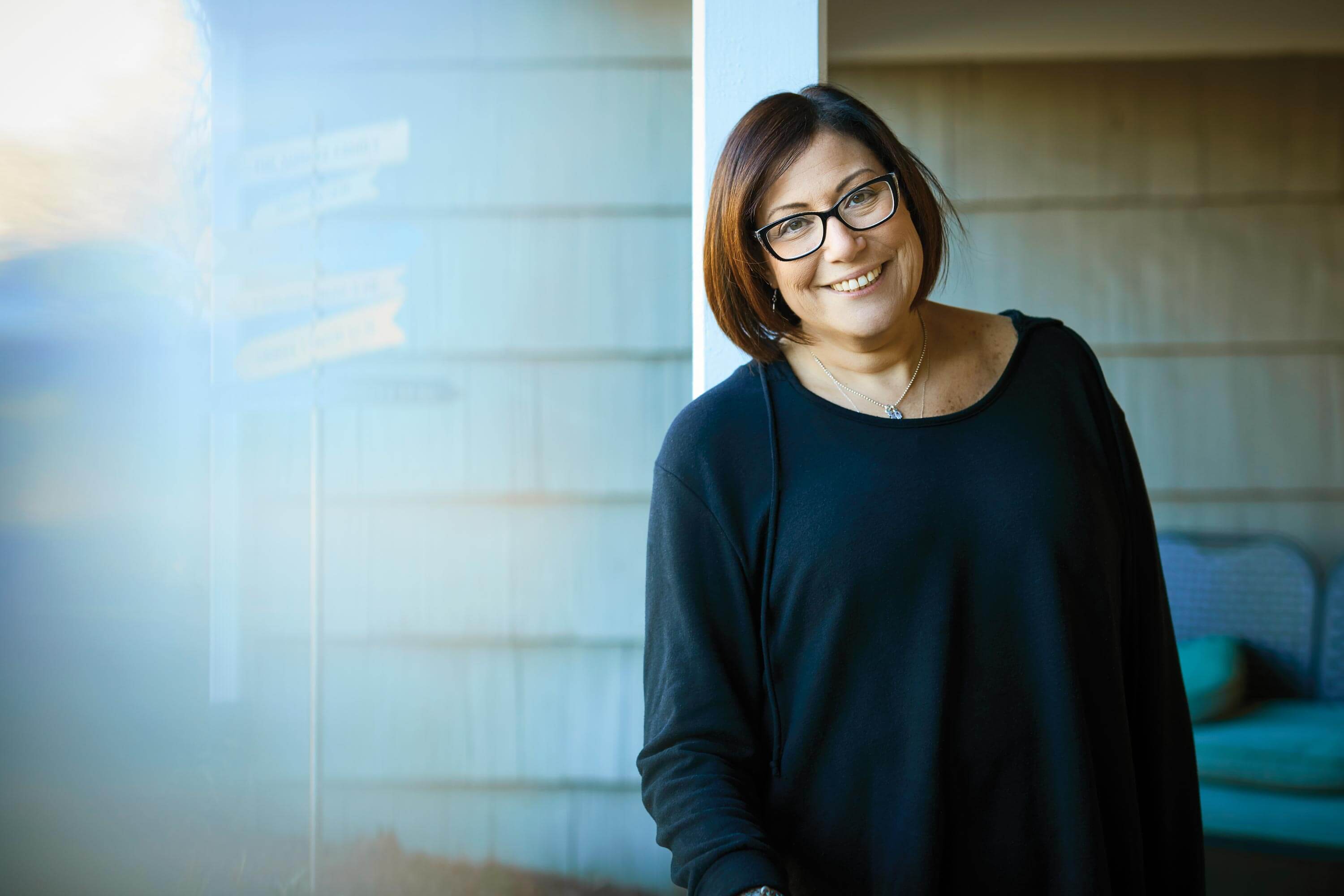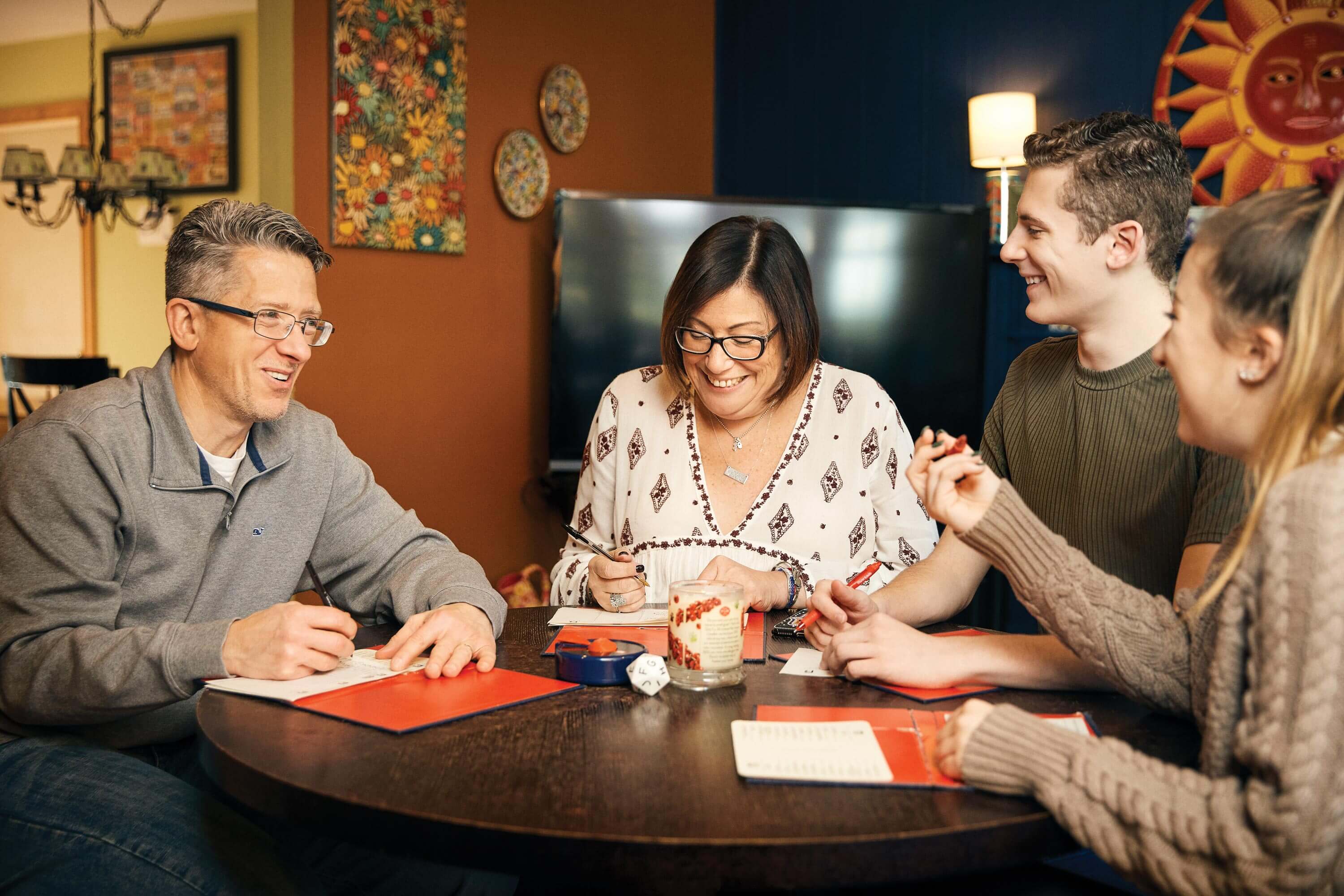
Signs of Life
Melissa Surdez ’91 will tell it like it is. She will tell you about the beauty of life—of the ways that college love can turn into marriage; of children that can come your way; of simple moments like when those children bound in from school to tell you of an aced test, a scorned crush, or of landing the coveted part in the school play.
She will also tell you about anger and true, crushing sadness—of unfair diagnoses when you had planned ahead, of mapping out your own funeral, of imagining the lives of those precious children and that husband moving on without you.
And Misse, as friends and family know her, will tell you about these things—about anything you ask really—in a no-nonsense manner, in a New Jersey accent, her language riddled with profanity and punctuated with laughter.
When Misse was 35 years old, her sister, Jessi Israel, a physician, convinced her to participate in some of the early genetic screenings that focused on the BRCA1/BRCA2 genes—indicators of breast cancer. The sisters knew their breast cancer risk was higher than most women. Their mother had been diagnosed with the disease at stage four, and died in 1988.
Knowing medicine like she did, Jessi wasn’t going to take any risks. The sisters were screened, and after six weeks, the results were in: Jessi, the elder by 15 months, was positive for the BRCA gene. Misse was negative. That meant that Jessi was facing a 90 percent chance of developing the disease unless she had a double mastectomy, which she promptly did.
Misse’s chances dropped to just 3 percent, and she went on about her life. She had been getting regular mammograms prior to the screening because of her family history. But the knowledge she now had in her back pocket—that figure of 3 percent—put her mind at ease. And she decided that she could wait on additional mammograms until the recommended age of 40.
“You tell a woman who has kids and is working for a living that she’s not going to have to squish her enormous boobs in that uncomfortable machine? Well, I’ll see you when I’m 40,” says Misse. “And I lived my life, from that point on, thinking I’m never getting breast cancer.”

It was a Saturday in the shower when she first felt the lump in her upper right breast. “It felt like an egg under the skin,” says Misse, “and I was like, ‘Shit, what the hell is that?’”
After breast exams by her sister and her gynecologist, she was given encouraging words—“It’s probably just a cyst”—and a script for a mammogram, which the doctors wanted to have completed quickly, within three days. Jessi encouraged her sister to come to Monmouth Medical Center, where she worked, so she could read the slides herself. Misse did as she was told and parked herself in the waiting room in her robe as her sister headed in to review the images. When the older sister returned, she had tears in her eyes. All she said was, “Misse, it’s not a cyst.”
But Misse, a senior human resources director with Johnson & Johnson, had had the screenings. She knew the risks, so her sister’s teary eyes, the need for additional testing, the quickness with which her doctor had requested she get the mammogram completed, simply escaped her. “Even at that moment, I was still like, ‘Well, what the hell could it possibly be? Did something get stuck in there?’”
Misse, the mother of two children named Quinn and Brielle, had stage three breast cancer. She was 40 years old—the same age her mother was when she died of the disease.
Genetic testing, Ancestry.com, and 23andMe are all wonderful things, says Misse, but you can’t use them alone. “Every ounce of information—like true, factual, non-fake news information—will help you make decisions,” she says. “But you still have to go off of all the other factors. My mother had breast cancer. So did my aunt, her sister. I had to go off of those facts, even though the one that made me make all my decisions—the results of the genetic test—came out negative. That was just a piece of information.” This is the kind of thing Misse tells people who call her today and ask her how she lives with a terminal illness. In addition to her role with Johnson & Johnson, she’s become a life coach and a confidante to others who received terminal diagnoses—she’s truly living, knowing how she will likely die.
When the diagnosis came—and then came again, when she was diagnosed with stage four breast cancer after a brief time of remission and given six months to live—Misse, Type A in the extreme, began making plans. “I do all the bills. I do everything. I balance the checkbook, so I came home that week, and I wrote a big spreadsheet for [my husband] Lance of all of the bills, all of the passwords, the usernames.” She called Johnson & Johnson to make sure the beneficiary information was up to date. She called the insurance company to understand her benefits. “I absolutely went into finalizing mode, but that, to me, only lasts so long. It only has a certain runway.”
This runway brought Misse to her own fork in the road. Sit tight and wait for death, or live with this particular hand. She decided to believe in modern medicine. To trust her oncologist. To trust her sister. And to do what she was told. What her sister told her was this: “Cancer is an individual sport. So when you go on the internet in a state of panic, and you start looking up survival rates, you have to remember: You’re only playing against your own self. Your DNA, your genetic makeup, are not in those stats.” Misse simplifies it: “I’m in my own swim lane.”
Misse Surdez is still riddled with cancer. It is not going to go away. She will not beat it. But that six-month lifespan has stretched on for nearly seven years. It was a combination of chemo drugs called Herceptin and Perjeta. Every three weeks, she takes a day off of work and gets chemotherapy.
Within 48 hours, she’s back up and running—working, mothering, life-coaching, and TED-talking about doing all of it with a terminal illness—and life is relatively normal. “She’s doing great,” says her husband, Lance ’90. “She lost weight; she’s going back to the gym; she’s eating healthy. You wouldn’t even know she had it.”
But she certainly does have it. There is no question. If her oncologist takes her off the drugs, she “lights up like a Christmas tree in the scans,” as he likes to put it. So, it’s as simple as that. She will take this combination of drugs for as long as she lives. The cancer, though contained, will always call her body home. And she’s using that to connect with others.
“If you’re diagnosed with a chronic illness, you’re going to be scared to death, and you’re probably going to start on the side of, ‘Jesus Christ, did this happen to you? Do you think I’m going to die? Will I die? What am I going to do?’” says Misse, who was named the 2016 Working Mother of the Year by Johnson & Johnson and today sits on the board of the Central and South New Jersey branch of Susan G. Komen. “And I’m going to hear that out. I’m going to ask you open questions. While you’re talking and telling me this story, I am getting a piece of you—one of the many thousands of stories that make up you, and I’m listening. I’m figuring out a way to connect and be able to use it back with you, so that you can start to see through to the other side and remember who your anchors in your life are.”
For Misse, those anchors are Lance and Brielle and Quinn and Jessi. Even though cancer would like to take her out, those anchors keep her grounded to this life. When she thinks too far ahead, when she takes herself out of the present moment when she’s laughing with her husband or hearing about her son’s college experience or her daughter’s final years of high school, she remembers, “Wait a minute, I can’t go anywhere. This is too grand, hanging out with these guys.”